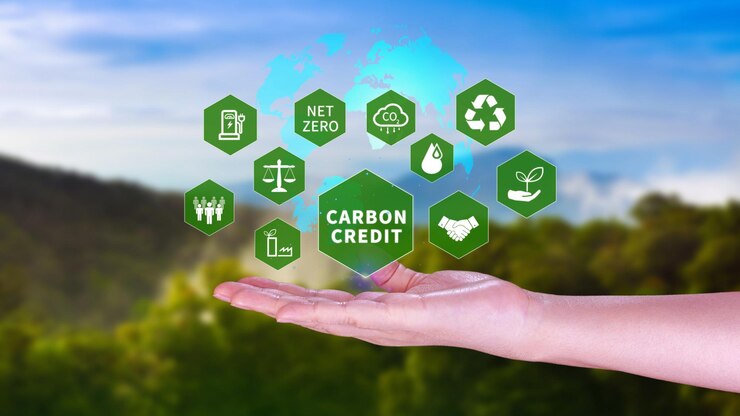How Carbon Credits Can Fuel Sustainability in the Oil & Gas Industry

The Oil & Gas industry is a cornerstone of global energy production, but it also faces a significant challenge: reducing its environmental footprint in the face of rising climate concerns. While transitioning to renewable energy sources is crucial in the long run, there's a pressing need for solutions in the here and now. This is where carbon credits emerge as a potential bridge on the path to sustainability.
Carbon credits represent verified emission reductions achieved through specific projects like renewable energy generation, forest conservation, or improved cookstoves. By investing in these credits, companies can offset their own emissions and contribute to measurable environmental benefits. But are carbon credits a viable strategy for the Oil & Gas industry? Let's delve into the potential benefits and considerations involved.
Benefits of Carbon Credits for Oil & Gas Companies:

Emission Reduction and Offsetting: The core benefit is clear. Carbon credits allow Oil & Gas companies to compensate for their unavoidable emissions by supporting projects that actively reduce greenhouse gases elsewhere. This contributes to reaching global climate goals and demonstrates a commitment to environmental responsibility.
Meeting Regulatory Landscape: The regulatory landscape regarding emissions is constantly evolving, with stricter regulations and carbon pricing mechanisms being implemented worldwide. Investing in carbon credits can help companies comply with these regulations and avoid potential fines or carbon taxes.
Boosting Brand Image and Social License: Consumers are increasingly making purchasing decisions based on a company's environmental practices. By investing in carbon credits, Oil & Gas companies can demonstrate their commitment to sustainability, improving brand image and public perception. Additionally, communities may be more receptive to Oil & Gas operations if companies can showcase efforts to mitigate their environmental impact.
Unlocking New Market Opportunities: A growing number of carbon markets offer financial incentives for companies with strong sustainability practices. Carbon credits can act as a gateway to these markets, opening doors to new revenue streams and potential partnerships with environmentally conscious businesses.
Driving Internal Efficiency: The process of identifying and evaluating carbon offset projects can have a positive ripple effect within Oil & Gas companies. It can encourage them to scrutinize their own operations, identify areas for emission reduction, and implement internal efficiency measures that not only benefit the environment but also reduce operational costs.
However, it's important to acknowledge some key considerations when venturing into the world of carbon credits:
Project Quality and Verification: The effectiveness of carbon credits hinges on the quality of the underlying projects. It's crucial to ensure invested-in credits represent real, measurable, additional, and permanent (MRVAP) emission reductions. Reputable verification and certification bodies play a vital role in this process.
Transparency and Credibility: Building trust is essential for the long-term viability of carbon credit markets. Choosing reputable carbon credit providers and implementing transparent project selection processes are key to demonstrating a genuine commitment to sustainability.
Cost-Effectiveness: The price of carbon credits can vary depending on project type, location, and quality. A thorough cost-benefit analysis is vital to ensure a balance between the cost of credits and the environmental impact achieved.
Double Counting Avoidance: Double counting, where the same emission reduction is counted by both the project and the company purchasing the credits, needs to be avoided to maintain the integrity of the system.
The Road Ahead: A Balanced Approach
Investing in carbon credits can be a valuable tool for the Oil & Gas industry as it navigates the path towards a sustainable future. However, it's crucial to approach this strategy with careful planning and execution. Carbon credits should be seen as one piece of a broader sustainability puzzle, alongside internal emission reduction efforts and a commitment to long-term renewable energy transition. By implementing a comprehensive strategy that combines these elements, the Oil & Gas industry can demonstrate its commitment to environmental responsibility while ensuring long-term business viability in a carbon-constrained world.
Partnership with EKI Energy for a Sustainable Future

WOCE recognizes the challenges and opportunities faced by the Oil & Gas industry in navigating the path to sustainability. That's why we've partnered with EKI Energy, a leading provider of high-quality carbon offset projects. EKI Energy offers a diverse portfolio of carbon credits that can help Oil & Gas companies achieve their sustainability goals:
Community-based projects: These projects contribute to positive social and environmental impacts while reducing emissions.
1. Improved Cookstoves (ICS) to reduce indoor air pollution and reliance on traditional fuels.
2. Access to Safe Drinking Water to improve health and reduce reliance on bottled water.
3. Household Biogas & LED Systems to provide clean cooking fuel and conserve energy.
Nature-based solutions: These projects promote long-term carbon sequestration and ecosystem restoration.
1. Afforestation & Reforestation Projects (A/R) to capture atmospheric carbon and promote biodiversity through tree planting.
2. Improved Forest Management Projects (IFM, REDD) to protect existing trees and enhance their carbon storage capacity.
3. Sustainable Agriculture & Land Management Projects to promote healthy soil practices that store carbon and reduce emissions.
4. Methane Reduction in Rice Farming to implement new techniques and reduce methane emissions, a potent greenhouse gas.
5. Restoration & Plantation of Mangroves to protect coastlines, store carbon, and provide critical habitat for marine life.
6. Grassland or Wetland Management to improve the health of these ecosystems and enhance their carbon storage capacity.
ESCO Energy Efficiency Projects: In addition to offsetting emissions, EKI Energy can also help Oil & Gas companies reduce emissions at the source through ESCO Energy Efficiency Projects. These projects identify and implement cost-saving measures that also contribute to lower emissions, creating a win-win situation for both the environment and your bottom line.
Conclusion:
Investing in carbon credits can be a valuable tool for the Oil & Gas industry as it navigates the path towards a sustainable future. However, it's crucial to approach this strategy with careful planning and execution. Carbon credits should be seen as one piece of a broader sustainability puzzle, alongside internal emission reduction efforts and a commitment to long-term renewable energy transition. By implementing a comprehensive strategy that combines these elements, the Oil & Gas industry can demonstrate its commitment to environmental responsibility while ensuring long-term business viability.




